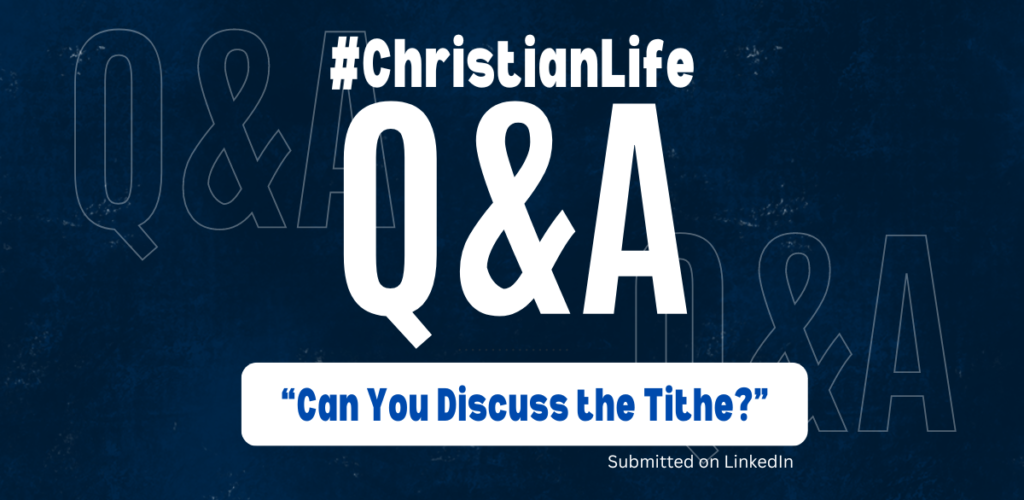Earlier in the week I asked on social media for your questions about the #ChristianLife and the things you still don’t understand about our faith. I will be answering them over the next few weeks as time allows. This first question came to me through LinkedIn, and I hope it answers clearly. If not, that’s what the comments are for!
By the way, if you don’t follow me on social media, I welcome you to my little community, and it’s not too late to submit your own questions, too: Facebook, Instagram, LinkedIn, Threads.
Down to business. The first questions I was asked was simply to discuss tithing, so here goes.
What is Tithing?
Basically, tithing is a practice originating in the Old Testament, whereby faithful adherents to Judaism were commanded to give 10% of their income toward God’s work, including funding the priesthood, the temple, and care for the poor. When Israel began as an agricultural society, God commanded them to give a tithe (meaning a tenth) of their annual harvest and newborn livestock back to Him as an offering. Later on, as the nation of Israel was established and modernized, this commandment extended to a tenth of a person’s income, no matter their trade.
The law of Moses states:
“Every tithe of the land, whether of the seed of the land or of the fruit of the trees, is the Lord’s; it is holy to the Lord. And every tithe of herds and flocks, every tenth animal of all that pass under the herdsman’s staff, shall be holy to the Lord.”
Leviticus 27:30,32
The giving of the tithe was an act of obedience, which was to demonstrate a person’s faith that everything comes from God and then to honor His provision through their obedient giving back to Him.
In the Old Testament, a tithe was exactly 10% and this offering was the first priority from a person’s income. Any giving beyond that was considered a secondary offering, usually in response to another life circumstance (sin offerings, thanksgiving offerings, etc.).
Is Tithing a New Testament Requirement?
Your pastor might not like me telling you the answer to this, but… No.
The New Testament does not teach that a Christian must give a tenth (tithe) of their personal income back to the Lord. Look through the scriptures all you want. It’s just not there.
What the New Testament Does Command is Generosity and Financial Stewardship.
While Christians are not commanded to give a “tithe,” the New Testament clearly calls us to be generous givers as stewards of the resources given by God.
Though I hear it often, today, when Paul wrote to the Corinthian church about their financial giving, he never pointed to a legal rule and said, “well, you know you have to give at least ten percent as a minimum. That is the starting point.” What Paul actually said is that each Christian must decide what to give for themselves, in response to God’s provision for them:
“The point is this: whoever sows sparingly will also reap sparingly, and whoever sows bountifully will also reap bountifully. Each one must give as he has decided in his heart, not reluctantly or under compulsion, for God loves a cheerful giver.”
2 Corinthians 9:6–7
Please notice, however, that although Paul did not declare a certain amount that should be given, he still says that believers “must give” something. Once again, the expectation that we would give back to God comes from an understanding that God is the source of all we have. In this way, the principle of giving does extend from the heart of the Old Testament tithe.
Another thing to note is that verse 6 makes giving sound transactional, like the more I give to God (sowing), the more I will receive in return (reaping). Before you jump to that conclusion, however, look at the very next verse:
“And God is able to make all grace abound to you, so that having all sufficiency in all things at all times, you may abound in every good work.”
2 Corinthians 9:8
Paul is NOT saying that we should give money in order to be blessed in return. Rather, Paul is teaching that when we invest in God’s Kingdom and work, the Lord will see our faithfulness and provide even more for us, to enable us to continue investing in His Kingdom and work. He doesn’t bless us for our own sake but does so to enable us to keep blessing Him in return! This is why Paul goes on to write:
“He who supplies seed to the sower and bread for food will supply and multiply your seed for sowing and increase the harvest of your righteousness. You will be enriched in every way to be generous in every way, which through us will produce thanksgiving to God.”
2 Corinthians 9:10–11
What Did Jesus Say About Giving?
When Jesus discussed the Old Testament law, such as in the Sermon on the Mount, the truth is He never throws out the commands of God. Instead, He shows how the law only lays a foundation of righteousness, and then He calls His followers to live at a higher standard than the law ever did.
For example, the law says, “do not kill,” but Jesus elevates this commandment to “do not even hold anger and hatred toward someone” (Matthew 5:21–22). The law also says, “do not commit adultery,” but Jesus elevates this command to “do not even look lustfully after her”(Matthew 5:27–28).
If Jesus’ standard requires us to set the bar higher, what does that mean for our financial giving?
Perhaps the reason the New Testament never commands us to tithe is because Jesus assumes our generosity will naturally go beyond a measly 10%. After all, He did say:
“Do not think that I have come to abolish the Law or the Prophets; I have not come to abolish them but to fulfill them. For truly, I say to you, until heaven and earth pass away, not an iota, not a dot, will pass from the Law until all is accomplished.”
Matthew 5:17–18
He then goes on to say:
“For I tell you, unless your righteousness exceeds that of the scribes and Pharisees, you will never enter the kingdom of heaven.”
Matthew 5:20
The truth is thatscribes and Pharisees gave their tithes perfectly, all the way down to 10% of their herb garden, but it did not make them righteous! They only gave because they had to according to the law. They didn’t do it with joy, to fulfill the work of God’s Kingdom (see Mathew 23:23).
The point is that in the Old Testament, giving the tithe was a legal obligation for the Jews. For the New Testament believer, however, there is no need for a commandment to give financially because as we are transformed into Jesus’ image, generosity is our nature! When we ask Him to be our Lord, we are giving Him our whole life as a sacrifice (Romans 12:1)! Our new passion as Christians is to show love, live in service to others, care for the poor, evangelize the lost, and see His justice and mercy at work in the world around us. And because those are our passions, we will cheerfully give funds to the cause of Christ.
Maybe I can say it this way:
As a Christian you are NOT commanded to give a tithe of your finances to the Lord. However, a refusal to give financially to support God’s work with a cheerful and generous heart may actually demonstrate that you are NOT a Christian at all. When you truly give Jesus your heart, you are willing to give Him all. True Christians (no matter how rich or poor they are personally) are the most generous people the world has ever seen because they are made in the image of a generous God.
We don’t give to get something back.
I need to emphasise this point. Giving to the Lord was NEVER a transactional agreement in the Old Testament or in the New! Remember, God does not need your money. He already owns it all (see Psalm 24:1).
Christians do not give our tithes and offerings in order to get God to do something for us in return. God is not obligated to do anything He does not want to and you can never do a big enough service for Him to get him into your debt.
Our giving is all about stewarding what God has already given to us, and showing our appreciation for it. It is also a declaration of dependence as we are committing our trust in Him to continue providing for us in the future. Malachi says when God’s people honor God through obedience in giving, He will continue to supply all our needs. (He doesn’t say all our wants, desires, and dreams.) Then, once our needs are met, God will continue to bless us so that we can be faithful in meeting the needs of others.
“Bring the full tithe into the storehouse, that there may be food in my house. And thereby put me to the test, says the Lord of hosts, if I will not open the windows of heaven for you and pour down for you a blessing until there is no more need.”
Malachi 3:10
The prosperity gospel teaches that when we give our money, God is indebted to us, and He owes us a bigger blessing in return. The more we give, the more we get.
Biblical giving, on the other hand, teaches that we are fully indebted to God for everything we have, and in response, we give back to Him in honor and obedience. As we do, He will continue to bless us in order to see His Kingdom continue to grow and other people to come to know Him just as we do.
God is not an investment account with a guaranteed 100-fold increase on the tithes and offerings you give. God is Jehovah Jireh (“I AM Provider”) in all things big and small. Tithing is an acknowledgment of, and a “thank you” for, that reality.
So What Does All This Mean?
- Christians are not commanded to tithe but are by nature generous givers, especially to the work of the Lord. Since God is our first priority, we will naturally want to honor Him first with our money (and our time, talents, and other resources).
- Since Jesus has our heart, He is also where we want to put our money (Matthew 6:21). In Him, we find our provision and our contentment; rather than in our bank accounts.
- Money is NOT our first love. Jesus is! So it is a natural outflow of our love for Him that we will contribute our money into the things He loves. This is not so we get more money in return, but so that we get more of Him – His heart and His delight.
If You are a Christian, but You Do Not Give Financially to the Lord and His Work:
I encourage you to take time right now and do some soul searching. It might be tough, but we need to truly check our hearts and the excuses we give.
Why don’t you give to the Lord?
Is it because you don’t think you have enough to give and still take care of yourself? Maybe that shows you trust yourself to be your provider more than you trust Him. (See Mark 12:41-44.)
Is it because you have too many other debts or you are saving up money for your future or for a bigger purchase? Maybe Jesus isn’t really your first love or the source of your joy. Maybe possessions are.
Is it a matter of greed? You have what you need, but you still want more, so you save, invest, and do all to accumulate wealth. You might need to check your salvation because you might actually find that money is the god you worship (see Matthew 6:24).
After an honest self-evaluation and maybe some repentance, then I suggest you take time to pray, listen to the Holy Spirit, and see where God is asking you to invest in His Kingdom. Where does he want to you give? When? And how much?
I try to make this kind of prayer my practice every time an opportunity to give arises. Whether it is preparing to give an offering in church, an opportunity to support a good Christian cause, to help out a person in need, or meet another need in my community, I want to pause and ask the Holy Spirit what He would have me do.
I don’t give out of guilt or manipulation. I don’t give just because its a good cause or a real need. But I do give ever time the Holy Spirit prompts me to do so.
Truthfully, I cannot give to everyone who asks me, and I am unable to support many people and causes that I’d really like to help. Yet, because we know Jesus has called us to be givers, like He is a giver, my wife and I have determined a certain amount of our income that we give every month to the ministry we serve under, as well as a baseline amount to the in whichever Sozo church we are in each week. We view those regular, set amount of giving as our “tithe” to the Lord, although it is certainly not limited to 10%.
After that, we do often give to individuals, programs, causes, and charities as the Lord leads us. We pray about it. We discuss it. And then we give as God directs us. And truthfully, it is sometimes painful to do so. We have given money many times that we really could not afford to give. Sometimes we have given money that we didn’t initially want to give. But we obey the Lord because we love Him more than we love our money.
And we want to be like Him.
Remember, God gave His most prized possession – His Son – for us. Even though Jesus didn’t want to die, He willingly gave His life for us so we might live forever. If that is the fact on which I hang my eternity, then what sacrifice can He ask me to make that is too much to give?
Nothing.
Thank you for taking time to read what I have written. I would love to hear your feedback in the comments, below!
One other quick note, as I’ve shared about my own giving habits. Please be aware that I do not give to solicitations for money through this website or through social media. I cannot, in good conscience, give money to someone or something I do not know. That would be very bad stewardship.
If you’re enjoying the content I produce, a little caffeine to keep me going would be appreciated!
© Anthony Scott Ingram 2023. All Rights Reserved.
Unless otherwise indicated, all Scripture quotations are from The Holy Bible, English Standard Version®, copyright © 2001 by Crossway Bibles, a publishing ministry of Good News Publishers. Used by permission. All rights reserved.”
Please note that I do get a small kickback from Amazon for any purchases made using the links on this post. Should you choose to purchase from them, I just want to say thank you for further supporting my work in ministry!



